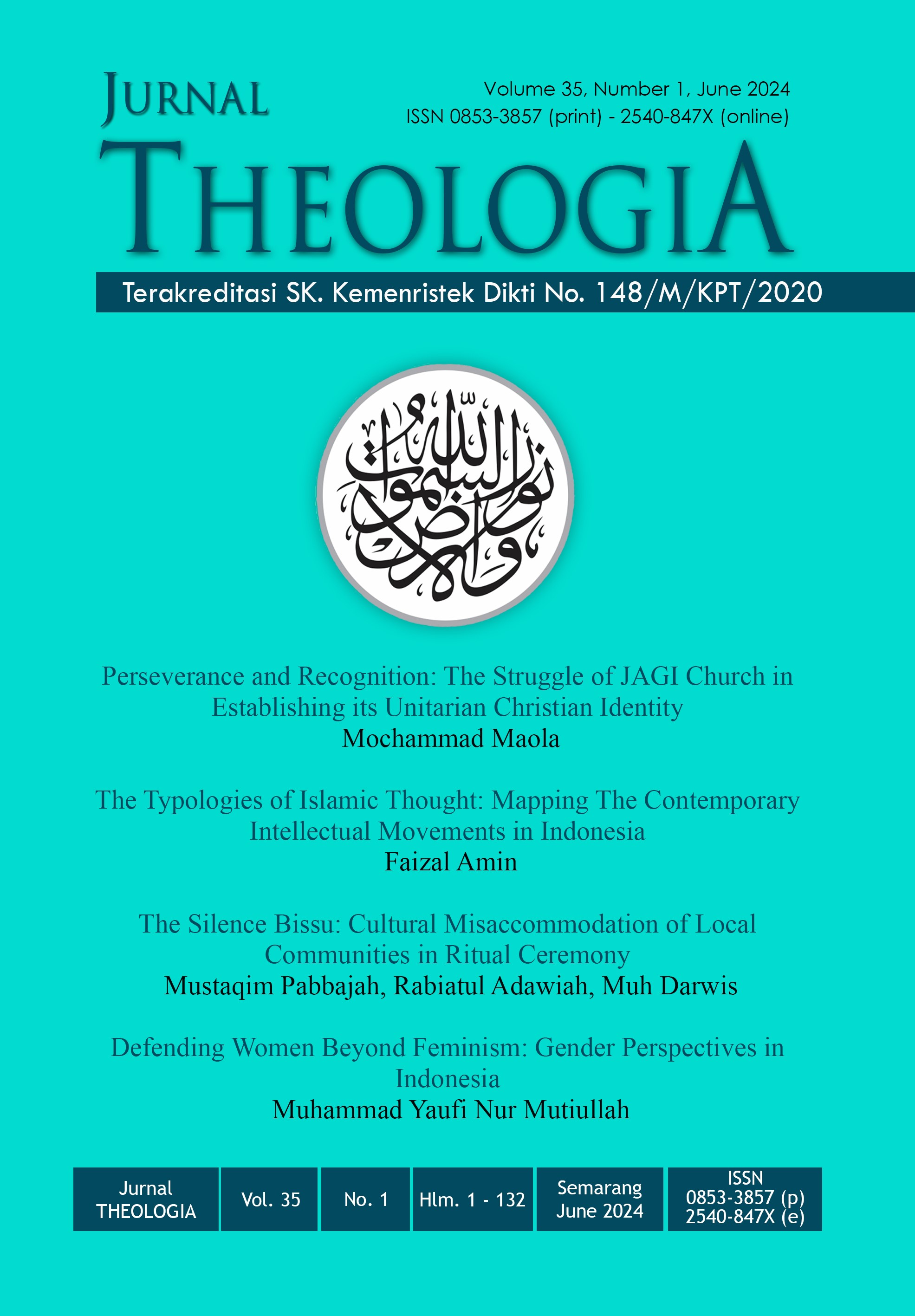Defending Women Beyond Feminism: Gender Perspectives in Indonesia
DOI:
https://doi.org/10.21580/teo.2024.35.1.18861Keywords:
Beyond Feminism, Defending Women, Gender Equality, Nahdlatul UlamaAbstract
This article examines the development of gender understanding in Indonesia. Specifically, the understanding of gender discussed in this article comes from the perspective of one of the leading Islamic organizations in Indonesia, namely Nahdlatul Ulama (NU), which has its own way of thinking in defending women's rights. This article aims to show that Nahdlatul Ulama's concept of defending women is different from the concept of feminism that emerged in Western civilization, namely by looking at the capabilities and capabilities of women themselves. Therefore, I use the words "Defending Women But Not Feminism" with the intention of emphasizing that the way NU defends women's rights is not based on the feminist paradigm way of thinking that has developed in modern times. The research methodology used in this research is a qualitative approach. This article uses library research procedures, especially analytical descriptive methods. This research uses book data, relevant literature, and other important sources. This research uses document analysis as a qualitative research methodology. The results of this research show that NU's thinking paradigm in defending women's rights is different from Western feminism. NU has a different view in defending women's rights, namely "beyond feminism”.
Downloads
References
Adisti, A. R. (2021). Reviving the Spirit of Gender Equality :Fatayat Nahdlatul Ulama between Idealism and Realization. Journal of Nahdlatul Ulama Studies, 2, 17–33. https://doi.org/10.35672/jnus.v2i1.
Arifianto, A. R. (2021). From ideological to political sectarianism: Nahdlatul Ulama, Muhammadiyah, and the state in Indonesia. Religion, State, and Society, 49, 126–141. https://doi.org/10.1080/09637494.2021.1902247
Asmani, J. M. (2015). Kepemimpinan Perempuan: Pergulatan Wacana Di Nahdlatul Ulama (NU). Addin, 9(1), 33–50.
Bammer, A. (1991). Partial Visions – Feminism and Utopianism in the 1970s. Routledge.
Boyer, C. (2022). Religious leaders can motivate men to cede power and reduce intimate partner violence: Experimental evidence from Uganda. Proceedings of the National Academy of Sciences of the United States of America, 119(31). https:// doi.org/10.1073/pnas.2200262119
Braidotti, R. (2003). Feminist Philosophies. In A Concise Companion to Feminist Theory. Blackwell Publishing.
Brooks, A. (1997). Postfeminism: Feminism, Cultural Theory and Cultural Forms. Routledge.
Budgeon, S. (2011). Third-Wave Feminism and the Politics of Gender in Late Modernity. Palgrave MacMillan.
De Beauvoir, S. (1956). The Second Sex. Lowe and Bryligne.
Donovan, J. (2012). Feminist Theory (4th ed.). Continuum.
Faizun, A. N. K. (2023). Rosiana Silalahi Pertanyakan Sikap Gus Yahya soal Feminisme, Ini Jawabannya. NU Online. https:// www.nu.or.id/nasional/rosiana-silalahi-pertanyakan_sikap-gus-yahya-soal-feminisme-ini-jawabannya-1O8WN
Faludi, S. (1991). Backlash: The Undeclared War Against American Women. Three Rivers Press.
Genz, S., & Brabon, B. (2009). Postfeminism: Cultural Text and Theories. Edinburgh University.
Gill, R., & Schraff. (2011). New Femininities: Postfeminism, Neoliberalism and Subjectivity. Palgrave MacMillan.
Gleadle, K. (n.d.). Radical Writing on Women, 1800- 1850. Palgrave MacMillan.
Gubar, S. (2000). Critical Condition: Feminism at the Turn of the Century. Columbia University Press.
Halford, A. (2021). ‘Come, Follow Me’, The Sacralising of the Home, and The Guardian of the Family: How Do European Women Negotiate the Domestic Space in the Church of Jesus Christ of Latter-Day Saints? Religion, 12(5). https:// doi.org/10.3390/rel12050338
Hasri, H. (2018). Emansipasi Wanita Di Negara Islam (Pemikiran Qasim Amin Di Mesir). AL-Khawarizmi, 2(2), 107–114.
Ilman, Z., & Aji, T. N. (2020). Partisipasi Politik Muslimat NU Dalam Pemilu Tahun 1955 Dan 1971. Avatara, 8(1).
Jenainati, C., & Judy, G. (2007). Introducing Feminism. Gutenberg Press.
Kirkham, M. (1997). Feminism, and Fiction.The Athole Press. The Athole Press.
Mahsun, M. (2021). Female Candidates, Islamic Women’s Organisations, and Clientelism in the 2019 Indonesian Elections. Journal of Current Southeast Asian Affairs, 40(1), 73–92. https://doi.org/10.1177/1868103420988729
Maryani, E. (2021). Indonesiatanpafeminis.id as a Challenge of Feminist Movement in Virtual Space. Frontiers in Sociology, 6. https://doi.org/10.3389/fsoc.2021.668840
McRobbie, A. (2009). The Aftermath of Feminism Gender, Culture, and Social Change. Sage Publications.
Niam, A. M. (2022). Terobosan Kiprah Perempuan di Perkumpulan Nahdlatul Ulama. NU Online. https://www.nu.or.id/risalah-redaksi/terobosan-kiprah-perempuan-di perkumpulan-nahdlatul-ulama-1kE1v
O’Brien, A., & Porter, M. (2005). Introduction. In Motherhood: Power and Oppression. Women’s Press.
Phoca, S., & Wright, R. (1999). Introducing Postfeminsim. Icon Books, Ltd.
Richardson, A. (2002). Mary Wollstonecraft on Education. In The Cambridge Companion to Mary Wollstonecraft. Cambridge University Press.
Ross, S. G. (2009). The Birth of Feminism – Women as Intellect in renaissance Italy and England. Harvard University Press.
Sanders, V. (2006). First Wave Feminism. In Cambridge Companion to Feminism and Postfeminism. Cambridge University Press.
Sarah, G. (2006). Companion to Feminism and Postfeminism. Cambridge University Press.
Siegel, D. (2007). Sisterhood Interrupted: From Radical Women to Grrls Gone Wild. Palgrave MacMillan.
Thompson, B. (2010). Multiracial Feminism: Recasting the Chronology of Second Wave Feminism. In No Permanent Waves- Recasting Histories of US Feminism. Rutgers University Press.
Thornham, S. (n.d.). Feminism and Film. In The Routledge Companion to Feminism and Postfeminism. Routledge.
Tong, R. (2009). Feminist Thought: A More Comprehensive Introduction. (3rd ed.). Westview Press.
Triono, A. L. (2022). Gus Yahya Tegaskan Keterlibatan Perempuan di PBNU Bukan untuk Isu Kesetaraan. NU Online. https://www.nu.or.id/nasional/gus-yahya-tegaskan-keterlibatan-perempuan-di-pbnu-bukan-untuk-isu-kesetaraan-gender-ztm72
Whelehan, I. (1995). Modern Feminist Thought – Second Wave to Postfeminism. Edinburgh Press.





















